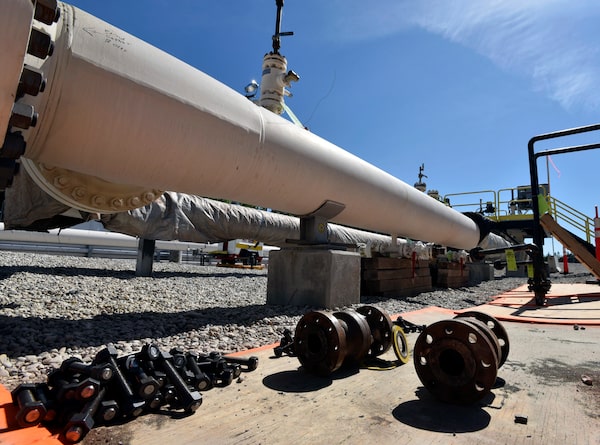
Without the Enbridge Line 5 pipeline, Ontario would be about 45-per-cent short of the crude oil it requires, according to Enbridge Inc. The supply from Line 5 is used, among other things, to produce gasoline and diesel for Ontario as well as 100 per cent of the jet fuel used at Toronto Pearson International Airport.Dale G. Young/The Associated Press
Ottawa says it’s willing to intervene if necessary in the Line 5 energy dispute between the state of Michigan and Enbridge Inc.
Michigan’s governor has ordered the May, 2021, shutdown of a major pipeline running through her state: a line that serves as a key energy conduit for Ontario and Quebec.
Michael Grant, a senior department of Global Affairs official, told a parliamentary committee Tuesday that the federal government would prefer that the U.S. state and the Canadian pipeline company resolve the issue amicably. Enbridge has taken the State of Michigan to court over the matter.
But, he said, Ottawa reserves the right to get involved. He said that could include invoking a 1977 bilateral pipeline treaty between Canada and the United States.
“Our priority is to find a friendly solution between Michigan and Enbridge,” Mr. Grant, assistant deputy minister responsible for the Americas, told MPs. He was responding to questions from Bloc Québécois MP Simon-Pierre Savard-Tremblay.
Mr. Grant said Ottawa intends to use “all possible tools to achieve this. If it’s necessary to use the 1977 agreement, we will use it.”
Under the decades-old treaty, Canada can request negotiations with the U.S., and if necessary binding arbitration, to settle the matter.
Right now, however, Mr. Grant said the federal government’s priority is working with Enbridge and affected provinces “in order to get American officials involved to find a solution.”
The Enbridge Line 5 pipeline carries petroleum from Western Canada through Great Lakes states to Ontario, where much of the crude is turned into gasoline and other fuels before the remainder is shipped via the Line 9 pipeline to Quebec refineries.
Without this pipeline, Ontario would be about 45-per-cent short of the crude oil it requires, according to Enbridge Inc. The supply from Line 5 is used, among other things, to produce gasoline and diesel for Ontario as well as 100 per cent of the jet fuel used at Toronto Pearson International Airport.
The pipeline from Michigan is also a critical source of supply for the Line 9 pipeline that runs from Ontario to Quebec and provides 40 per cent to 50 per cent of the crude oil that is used by Quebec refineries to make gasoline and other fuels. Line 5 also provides 55 per cent of Michigan’s propane needs.
Canadian politicians and business groups have warned of significant disruption to fuel supplies to this country’s two most populous provinces if the Enbridge Line 5 pipeline ceases operation this spring.
In November, Michigan Governor Gretchen Whitmer, citing the risk of an oil spill, announced that she would revoke an easement granted in 1953 that allows Line 5 to cross the Straits of Mackinac, a waterway in the state.
Lawrence Herman, a Toronto-based international trade lawyer, said the 1977 treaty was designed for pipelines such as Line 5 that transmit petroleum through another country.
The objective, as its preamble makes clear, is to “ensure the uninterrupted transmission” of such pipelines.
He said whether the U.S. government steps in to help fix this dispute will be a test of the Biden-Trudeau relationship. “Washington has to get this resolved and get Michigan to back off its outrageous threat.”
“The 1977 agreement is a binding treaty that governs the Line 5 situation. The U.S. is bound under the oldest principle in international law to comply in good faith with its terms.
Mr. Herman said article two of the treaty “prevents all public authorities – which includes those in Michigan – from interfering in any way with this guaranty of transit.”
He noted that Line 5 is a different case from the Keystone XL expansion – killed by the Biden administration – because that “was a project and not an operating line.”
Businesses have warned that a shutdown could also trigger significant layoffs of refinery jobs in Sarnia, Ont., and would be a blow to Western Canadian crude producers as well.
Analysts say a shutdown would force Ontario and Quebec to find other sources of crude oil for refining and import this petroleum by rail or truck or ship – a potentially more dangerous and environmentally damaging method of transport.
The Line 5 crossing of the Straits of Mackinac is currently submerged, but Enbridge has applied for regulatory approval to build a tunnel that would further protect it.
“In the meantime, Line 5 must stay open. It is a critical piece of North American energy infrastructure that benefits both Canada and the U.S.,” Enbridge spokesman Todd Nogier said Tuesday.
Enbridge has said it will not stop shipping petroleum through Line 5 in May unless a court orders it to do so.
Know what is happening in the halls of power with the day’s top political headlines and commentary as selected by Globe editors (subscribers only). Sign up today.